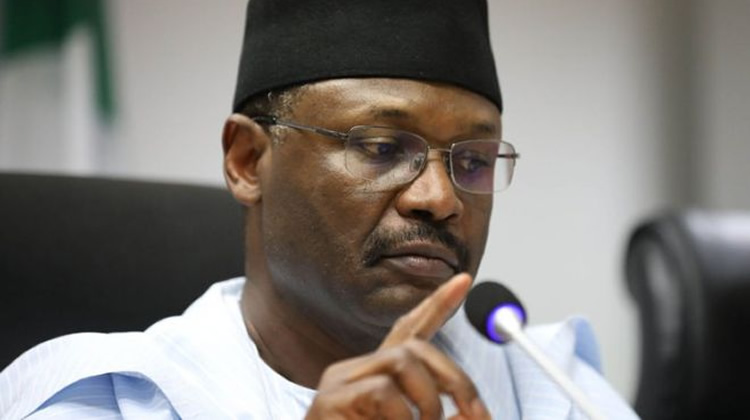
The Independent National Electoral Commission has postponed governorship and state assemblies elections earlier scheduled for Saturday to March 18.
The commission took the decision at its management meeting in Abuja, which was convened on Wednesday after the Court of Appeal gave it the go-ahead to reconfigure Bimodal Voter Accreditation machines.
The meeting, which started at 7pm and ended at 10pm, was presided over by its National Chairman, Prof. Mahmood Yakubu.
In a statement by its National Commissioner and Chairman Information and Voter Education Committee, Festus Okoye on Wednesday night, INEC said it could not go ahead with the governorship poll as earlier scheduled because it needed time to reconfigure BIVAS machines, which were used for the presidential election on February 25.
The Court of Appeal had earlier on Wednesday granted permission to INEC to reconfigure BIVAS used for the presidential election.
The appellate court panel held that allowing the objections of the Labour Party and its presidential candidate, Peter Obi, would amount to “tying the hands of the respondent, INEC.”
In the wake of the declaration of the All Progressives Congress candidate, Bola Tinubu as the president-elect, Obi had approached the appellate court where he secured an order restraining the commission from reconfiguring the BVAS used for the election.
The court handed down the order in the ruling it gave on Friday granting permission to Obi and his Peoples Democratic Party counterpart, Atiku Abubakar to inspect the sensitive materials used for the conduct of the election.
But the electoral body in an application asked the court to vary its order restraining it from tampering with the BVAS machines, which it argued, had to be reconfigured for the governorship and state assembly polls.
Delivering its ruling during proceedings on Wednesday which was attended by the LP standard bearer and a retinue of party bigwigs, the panel presided over by Justice Joseph Ikyegh, dismissed the objections by Obi and his party and held that the backup files on the server could not be lost.
Delivering the lead ruling, Justice Haruna Tsammani, said restraining INEC would affect next Saturday’s governorship election.
He also chided the applicants for repeating their request to be allowed to scan and make copies of the electoral materials in INEC’s possession, stating that it amounted to an abuse of the court process.
Tsammani noted that INEC had in an affidavit filed before the court assured that the accreditation data contained in the BVAS could not be tampered with or lost.
The jurist further stated that neither Obi nor LP filed a counter-affidavit to challenge the argument in INEC’s affidavit.
Gov poll
Tsammani said, “constraining or restricting the respondent (INEC) from the use of the BVAS machines for any other purpose, and particularly considering the governorship and Houses of Assembly elections coming up on the 11th of March 2013.”
Justice James Abundaga who delivered the lead ruling in the motion by INEC for the variation of the Presidential Election Tribunal’s earlier orders struck it out for being unmeritorious.
Abundaga said the apprehension expressed in the motion by INEC was unnecessary because the tribunal never granted any order for any applicant to scientifically access the electoral body’s database.
He said, “We made the orders of 3rd March 2023 which are sought to be varied by this application. The court did not in any of those orders authorise the applicants to access the database of the applicant (INEC).
“Therefore, the fear that the orders we made, if not varied, will expose the identities of the voters and who they cast their votes for is not genuine.
“We made the orders, very conscious of the court’s power to do so pursuant to the Electoral Act, particularly, Section 74 of the Act to enable the respondent herein (Obi and LP) to have simple access to electoral materials for the purpose of instituting and maintaining their petition if they ever wish to file any.
“We take judicial notice that similar applications to access electoral materials for the purpose of instituting petitions were made by other applicants.
“The respondents are hereby reminded, in case of any misapprehension by any of them, that the court did not, in any of those orders granted, authorise the applicants therein, the permission to electronically open the applicant’s database.”
Before the court gave INEC the go-ahead on BVAS reconfiguration the commission had yet to start the distribution of election materials in many states.
The commission had told the court on Tuesday that reconfiguration of BVAS would take two or three days.
But in the statement on Wednesday night, INEC recalled that on March 3, Presidential Election Petition Tribunal gave an ex-parte order for some political parties to inspect materials used for the presidential election, including the forensic inspection of over 176,000 BVAS used in the election.
INEC added that it approached the tribunal to reconsider the order, given that the BVAS systems were to be deployed for the Governorship and State Assembly elections and that the lack of a clearly defined timeframe for the inspection could disrupt the commission’s ability to conduct the outstanding elections.
“For instance, the BVAS can only be activated on the specific date and time of an election. Having been used for the Presidential and National Assembly elections on 25th February 2023, it is necessary to reconfigure the BVAS for activation on the date of the Governorship and State Assembly elections,” it added.



